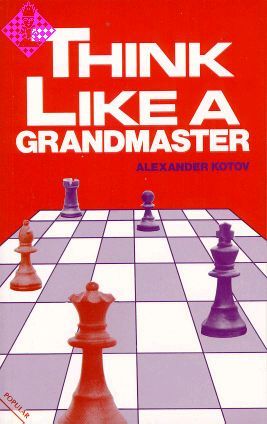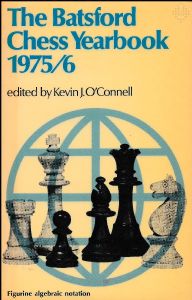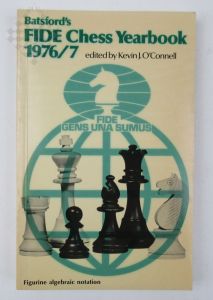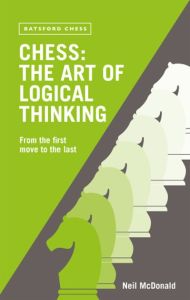Artikelnummer
LMKOTTLAG
Autor
Think Like a Grandmaster
192 Seiten, kartoniert, Batsford Chess, 1995
Final vergriffen
Few books have had as much impact on chess literature as Think Like a Grandmaster, the first edition of which sold out within three months, and was immediately recognized as a chess classic:
'This is a remarkable book. It will make the average player underhow a grandmaster thinks - and even more important, how he works, and it will show any player how he can think and play a lot better than he does ... it is a pleasure to recommend it.' (C H O'D Alexander, The Sunday Times)
Now, more than twenty years later, it is one of the best-selling chess books of all time and is still one of the best practical trainmanuals available, retaining its freshness of approach and relevance to chess in the 1990s and beyond.
'... played a part in the "English Chess Explosion" of the 1970s, as even lowly club players mastered the technique of thinking out candidate moves and working along the tree of analysis.'
(Bernard Cafferty, British Chess Magazine)
For the first time, Think Like a Grandmaster is now available in modern algebraic notation, making it accessible to a whole new generation of players. It will be as invaluable to players of the 1990s as it was to those of the 1970s.
Preface
An immense number of books have been written on chess. Some chess writers annotate recent games, othcompile and bring up to date works on opening variations, but, strange as it may seem, no one has had the idea of describing the methby which the leading players of our time have reached the peak of their playing strength. Yet a study of these methods would greatly facilithe process of mastering the inof the game.
In this book the author describes how Botvinnik, Tal, Smyslov, Petrosian, Keres, Bronstein and many other leading grandmasters studied chess theory, and trained themselves to understand the mysteries of chess strategy and tactics. They themhave revealed some of their methods in articles and game annowhile I have become acwith others from personal conversations with my fellow grand
The reader will also find an acof my own personal experi- my achievements in the field of chess are the result of immense hard work in studying theory, and I flatter myself that this experience will prove to be of interest to the reader.
Chess is a complex game, yet millions of enthusiasts are fasciby it. Some of them reach the playing strength of a first or second category player, while others are satisfied to be known all their life as 'a beginner'. Yet surely even a weak player would like to win a chess title and be known as master, or even grandmaster. If someone could only show them how to reach this goal, then many of these enthuwould be prepared to set off along the long and irksome road of tournament play with all its exciting and nerve-racking experiences.
How then does one become a grandmaster? Is it the case that a strong player's abilities are purely natural, and that hard work cannot change anything? Naturally there must be some inherent ability, but as in other spheres of human endeavthe main factor is immense, unseffort to master the skills of chess strategy and tactics.
That great chess thinker Emanuel Lasker asserted that in the space of 100 hours he could produce a first-category player from a young man of average ability. Could one go furthan that? Lasker never had occasion to prove the validity of his claim; the question naturally arises:
Could one by dint of careful study and hard work go as far as becoming a master or in the end a grandmas
My own experience tells me that such study and hard work do lead to immense improvements in one's practical results. I would remind the reader that up to 1938 I had never managed to reach master standard, but my study of the game in the pe1936-37 led suddenly to a 'great leap forward'. I gained the master title in 1938 and only one year later that of grandmaster. It folthat one can become a grandby one's own endeavours: one merely has to work hard at it. How exactly to go about it is conin this book.
A few points are worth noting:
1) My desire to make the book as clear and helpful as possible has led me to employ new names for some strategic laws and concepts. This was not done in an attempt to
try for an unnecessarily scientific approach, but merely to help the memorisation of important points.
2) The book makes use to a large extent of the games and advice of those Soviet grandmasters who beto what is now called the older generation. The reason for this is that all my chess career I have rubbed shoulders with Botvinnik, Keres and Smyslov. The younger grandmasters, on the other hand, are busy with their current tournament battles and write less about their thought processes at the board, norrestricting themselves to givconcrete variations.
3) The book contains games by the author - again easily underas, in aiming to describe the secrets of the chess mind, I have naturally had to dig down deep into my own brain.
So, dear reader, forward into batto storm the heights of grandchess!
'This is a remarkable book. It will make the average player underhow a grandmaster thinks - and even more important, how he works, and it will show any player how he can think and play a lot better than he does ... it is a pleasure to recommend it.' (C H O'D Alexander, The Sunday Times)
Now, more than twenty years later, it is one of the best-selling chess books of all time and is still one of the best practical trainmanuals available, retaining its freshness of approach and relevance to chess in the 1990s and beyond.
'... played a part in the "English Chess Explosion" of the 1970s, as even lowly club players mastered the technique of thinking out candidate moves and working along the tree of analysis.'
(Bernard Cafferty, British Chess Magazine)
For the first time, Think Like a Grandmaster is now available in modern algebraic notation, making it accessible to a whole new generation of players. It will be as invaluable to players of the 1990s as it was to those of the 1970s.
Preface
An immense number of books have been written on chess. Some chess writers annotate recent games, othcompile and bring up to date works on opening variations, but, strange as it may seem, no one has had the idea of describing the methby which the leading players of our time have reached the peak of their playing strength. Yet a study of these methods would greatly facilithe process of mastering the inof the game.
In this book the author describes how Botvinnik, Tal, Smyslov, Petrosian, Keres, Bronstein and many other leading grandmasters studied chess theory, and trained themselves to understand the mysteries of chess strategy and tactics. They themhave revealed some of their methods in articles and game annowhile I have become acwith others from personal conversations with my fellow grand
The reader will also find an acof my own personal experi- my achievements in the field of chess are the result of immense hard work in studying theory, and I flatter myself that this experience will prove to be of interest to the reader.
Chess is a complex game, yet millions of enthusiasts are fasciby it. Some of them reach the playing strength of a first or second category player, while others are satisfied to be known all their life as 'a beginner'. Yet surely even a weak player would like to win a chess title and be known as master, or even grandmaster. If someone could only show them how to reach this goal, then many of these enthuwould be prepared to set off along the long and irksome road of tournament play with all its exciting and nerve-racking experiences.
How then does one become a grandmaster? Is it the case that a strong player's abilities are purely natural, and that hard work cannot change anything? Naturally there must be some inherent ability, but as in other spheres of human endeavthe main factor is immense, unseffort to master the skills of chess strategy and tactics.
That great chess thinker Emanuel Lasker asserted that in the space of 100 hours he could produce a first-category player from a young man of average ability. Could one go furthan that? Lasker never had occasion to prove the validity of his claim; the question naturally arises:
Could one by dint of careful study and hard work go as far as becoming a master or in the end a grandmas
My own experience tells me that such study and hard work do lead to immense improvements in one's practical results. I would remind the reader that up to 1938 I had never managed to reach master standard, but my study of the game in the pe1936-37 led suddenly to a 'great leap forward'. I gained the master title in 1938 and only one year later that of grandmaster. It folthat one can become a grandby one's own endeavours: one merely has to work hard at it. How exactly to go about it is conin this book.
A few points are worth noting:
1) My desire to make the book as clear and helpful as possible has led me to employ new names for some strategic laws and concepts. This was not done in an attempt to
try for an unnecessarily scientific approach, but merely to help the memorisation of important points.
2) The book makes use to a large extent of the games and advice of those Soviet grandmasters who beto what is now called the older generation. The reason for this is that all my chess career I have rubbed shoulders with Botvinnik, Keres and Smyslov. The younger grandmasters, on the other hand, are busy with their current tournament battles and write less about their thought processes at the board, norrestricting themselves to givconcrete variations.
3) The book contains games by the author - again easily underas, in aiming to describe the secrets of the chess mind, I have naturally had to dig down deep into my own brain.
So, dear reader, forward into batto storm the heights of grandchess!
Few books have had as much impact on chess literature as Think Like a Grandmaster, the first edition of which sold out within three months, and was immediately recognized as a chess classic:
'This is a remarkable book. It will make the average player underhow a grandmaster thinks - and even more important, how he works, and it will show any player how he can think and play a lot better than he does ... it is a pleasure to recommend it.' (C H O'D Alexander, The Sunday Times)
Now, more than twenty years later, it is one of the best-selling chess books of all time and is still one of the best practical trainmanuals available, retaining its freshness of approach and relevance to chess in the 1990s and beyond.
'... played a part in the "English Chess Explosion" of the 1970s, as even lowly club players mastered the technique of thinking out candidate moves and working along the tree of analysis.'
(Bernard Cafferty, British Chess Magazine)
For the first time, Think Like a Grandmaster is now available in modern algebraic notation, making it accessible to a whole new generation of players. It will be as invaluable to players of the 1990s as it was to those of the 1970s.
Preface
An immense number of books have been written on chess. Some chess writers annotate recent games, othcompile and bring up to date works on opening variations, but, strange as it may seem, no one has had the idea of describing the methby which the leading players of our time have reached the peak of their playing strength. Yet a study of these methods would greatly facilithe process of mastering the inof the game.
In this book the author describes how Botvinnik, Tal, Smyslov, Petrosian, Keres, Bronstein and many other leading grandmasters studied chess theory, and trained themselves to understand the mysteries of chess strategy and tactics. They themhave revealed some of their methods in articles and game annowhile I have become acwith others from personal conversations with my fellow grand
The reader will also find an acof my own personal experi- my achievements in the field of chess are the result of immense hard work in studying theory, and I flatter myself that this experience will prove to be of interest to the reader.
Chess is a complex game, yet millions of enthusiasts are fasciby it. Some of them reach the playing strength of a first or second category player, while others are satisfied to be known all their life as 'a beginner'. Yet surely even a weak player would like to win a chess title and be known as master, or even grandmaster. If someone could only show them how to reach this goal, then many of these enthuwould be prepared to set off along the long and irksome road of tournament play with all its exciting and nerve-racking experiences.
How then does one become a grandmaster? Is it the case that a strong player's abilities are purely natural, and that hard work cannot change anything? Naturally there must be some inherent ability, but as in other spheres of human endeavthe main factor is immense, unseffort to master the skills of chess strategy and tactics.
That great chess thinker Emanuel Lasker asserted that in the space of 100 hours he could produce a first-category player from a young man of average ability. Could one go furthan that? Lasker never had occasion to prove the validity of his claim; the question naturally arises:
Could one by dint of careful study and hard work go as far as becoming a master or in the end a grandmas
My own experience tells me that such study and hard work do lead to immense improvements in one's practical results. I would remind the reader that up to 1938 I had never managed to reach master standard, but my study of the game in the pe1936-37 led suddenly to a 'great leap forward'. I gained the master title in 1938 and only one year later that of grandmaster. It folthat one can become a grandby one's own endeavours: one merely has to work hard at it. How exactly to go about it is conin this book.
A few points are worth noting:
1) My desire to make the book as clear and helpful as possible has led me to employ new names for some strategic laws and concepts. This was not done in an attempt to
try for an unnecessarily scientific approach, but merely to help the memorisation of important points.
2) The book makes use to a large extent of the games and advice of those Soviet grandmasters who beto what is now called the older generation. The reason for this is that all my chess career I have rubbed shoulders with Botvinnik, Keres and Smyslov. The younger grandmasters, on the other hand, are busy with their current tournament battles and write less about their thought processes at the board, norrestricting themselves to givconcrete variations.
3) The book contains games by the author - again easily underas, in aiming to describe the secrets of the chess mind, I have naturally had to dig down deep into my own brain.
So, dear reader, forward into batto storm the heights of grandchess!
'This is a remarkable book. It will make the average player underhow a grandmaster thinks - and even more important, how he works, and it will show any player how he can think and play a lot better than he does ... it is a pleasure to recommend it.' (C H O'D Alexander, The Sunday Times)
Now, more than twenty years later, it is one of the best-selling chess books of all time and is still one of the best practical trainmanuals available, retaining its freshness of approach and relevance to chess in the 1990s and beyond.
'... played a part in the "English Chess Explosion" of the 1970s, as even lowly club players mastered the technique of thinking out candidate moves and working along the tree of analysis.'
(Bernard Cafferty, British Chess Magazine)
For the first time, Think Like a Grandmaster is now available in modern algebraic notation, making it accessible to a whole new generation of players. It will be as invaluable to players of the 1990s as it was to those of the 1970s.
Preface
An immense number of books have been written on chess. Some chess writers annotate recent games, othcompile and bring up to date works on opening variations, but, strange as it may seem, no one has had the idea of describing the methby which the leading players of our time have reached the peak of their playing strength. Yet a study of these methods would greatly facilithe process of mastering the inof the game.
In this book the author describes how Botvinnik, Tal, Smyslov, Petrosian, Keres, Bronstein and many other leading grandmasters studied chess theory, and trained themselves to understand the mysteries of chess strategy and tactics. They themhave revealed some of their methods in articles and game annowhile I have become acwith others from personal conversations with my fellow grand
The reader will also find an acof my own personal experi- my achievements in the field of chess are the result of immense hard work in studying theory, and I flatter myself that this experience will prove to be of interest to the reader.
Chess is a complex game, yet millions of enthusiasts are fasciby it. Some of them reach the playing strength of a first or second category player, while others are satisfied to be known all their life as 'a beginner'. Yet surely even a weak player would like to win a chess title and be known as master, or even grandmaster. If someone could only show them how to reach this goal, then many of these enthuwould be prepared to set off along the long and irksome road of tournament play with all its exciting and nerve-racking experiences.
How then does one become a grandmaster? Is it the case that a strong player's abilities are purely natural, and that hard work cannot change anything? Naturally there must be some inherent ability, but as in other spheres of human endeavthe main factor is immense, unseffort to master the skills of chess strategy and tactics.
That great chess thinker Emanuel Lasker asserted that in the space of 100 hours he could produce a first-category player from a young man of average ability. Could one go furthan that? Lasker never had occasion to prove the validity of his claim; the question naturally arises:
Could one by dint of careful study and hard work go as far as becoming a master or in the end a grandmas
My own experience tells me that such study and hard work do lead to immense improvements in one's practical results. I would remind the reader that up to 1938 I had never managed to reach master standard, but my study of the game in the pe1936-37 led suddenly to a 'great leap forward'. I gained the master title in 1938 and only one year later that of grandmaster. It folthat one can become a grandby one's own endeavours: one merely has to work hard at it. How exactly to go about it is conin this book.
A few points are worth noting:
1) My desire to make the book as clear and helpful as possible has led me to employ new names for some strategic laws and concepts. This was not done in an attempt to
try for an unnecessarily scientific approach, but merely to help the memorisation of important points.
2) The book makes use to a large extent of the games and advice of those Soviet grandmasters who beto what is now called the older generation. The reason for this is that all my chess career I have rubbed shoulders with Botvinnik, Keres and Smyslov. The younger grandmasters, on the other hand, are busy with their current tournament battles and write less about their thought processes at the board, norrestricting themselves to givconcrete variations.
3) The book contains games by the author - again easily underas, in aiming to describe the secrets of the chess mind, I have naturally had to dig down deep into my own brain.
So, dear reader, forward into batto storm the heights of grandchess!
| EAN | 9780713478853 |
|---|---|
| Gewicht | 250 g |
| Hersteller | Batsford Chess |
| Breite | 13,8 cm |
| Höhe | 21,5 cm |
| Medium | Buch |
| Erscheinungsjahr | 1995 |
| Autor | Alexander Kotow |
| Sprache | Englisch |
| ISBN-10 | 0713478853 |
| ISBN-13 | 9780713478853 |
| Seiten | 192 |
| Einband | kartoniert |
| Diagramme | 162 |
007 Symbols
009 Preface
011 Introduction: An Unusual Experiment
015 1 Analysis of Variations
015 Do you Know how to Analyse?
017 Historical Digression
024 The Tree of Analysis
031 Forced and Unforced Variations
033 Different Types of Tree
033 Bare Trunk
037 A 'Coppice'
039 Thickets of Variations'
041 Selection of Candidate Moves
042 What is a Candidate Move?
051 'Creeping Moves'
054 Gross Blunders
054 Dizziness due to Success
060 Conditioned Reflexes
065 The Blind Spot
067 Through the Eyes of a Patzer - Blumenfeld's Rule
069 More Practical Advice
069 To Analyse or Not to Analyse?
072 Positions for Analysis or Judgement
074 Trust your Opponent or Not?
076 Time-trouble
079 Exercises
082 2 Positional Judgement
084 Open Lines and Diagonals
089 Modern Ideas on Open Lines
095 Pawn Structure and Weak Squares
095 Weak Squares
099 Passed Pawns
100 Pawn Islands
103 Weak Colour Complexes
108 The Position of the Pieces
114 Poor Position of a Number of Pieces
120 Space and the Centre
124 Exercises
125 An Experiment Continued
127 Imitate Botvinnik or Najdorf?
129 What is Concrete and What is General?
130 General Questions and Preparation
130 The Opening
130 Middlegame
131 The Ending
131 General Formulae and Concrete Analysis
136 3 Planning
136 A Single Plan
140 Planlessness Punished
143 Be Flexible
147 The Centre
147 Closed Centre
149 Open Centre
150 Mobile Centre
152 Fixed Centre
153 Tension in the Centre
154 Exercises
156 4 The Ending
165 5 A Player's Knowledge
166 Opening Study
170 Is it Possible to Study the Middlegame?
172 Adjourned Games
175 Advice on Various Questions
175 Chess and Life
176 The Factors of Success
177 Know Your Opponent
178 Know Thyself!
181 Solutions to the Exercises
185 Index of Names
009 Preface
011 Introduction: An Unusual Experiment
015 1 Analysis of Variations
015 Do you Know how to Analyse?
017 Historical Digression
024 The Tree of Analysis
031 Forced and Unforced Variations
033 Different Types of Tree
033 Bare Trunk
037 A 'Coppice'
039 Thickets of Variations'
041 Selection of Candidate Moves
042 What is a Candidate Move?
051 'Creeping Moves'
054 Gross Blunders
054 Dizziness due to Success
060 Conditioned Reflexes
065 The Blind Spot
067 Through the Eyes of a Patzer - Blumenfeld's Rule
069 More Practical Advice
069 To Analyse or Not to Analyse?
072 Positions for Analysis or Judgement
074 Trust your Opponent or Not?
076 Time-trouble
079 Exercises
082 2 Positional Judgement
084 Open Lines and Diagonals
089 Modern Ideas on Open Lines
095 Pawn Structure and Weak Squares
095 Weak Squares
099 Passed Pawns
100 Pawn Islands
103 Weak Colour Complexes
108 The Position of the Pieces
114 Poor Position of a Number of Pieces
120 Space and the Centre
124 Exercises
125 An Experiment Continued
127 Imitate Botvinnik or Najdorf?
129 What is Concrete and What is General?
130 General Questions and Preparation
130 The Opening
130 Middlegame
131 The Ending
131 General Formulae and Concrete Analysis
136 3 Planning
136 A Single Plan
140 Planlessness Punished
143 Be Flexible
147 The Centre
147 Closed Centre
149 Open Centre
150 Mobile Centre
152 Fixed Centre
153 Tension in the Centre
154 Exercises
156 4 The Ending
165 5 A Player's Knowledge
166 Opening Study
170 Is it Possible to Study the Middlegame?
172 Adjourned Games
175 Advice on Various Questions
175 Chess and Life
176 The Factors of Success
177 Know Your Opponent
178 Know Thyself!
181 Solutions to the Exercises
185 Index of Names
Mehr von Batsford Chess
-
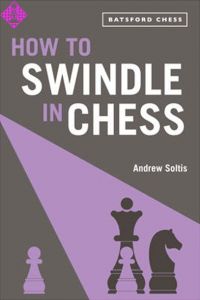 How to Swindle in Chess17,95 €
How to Swindle in Chess17,95 € -
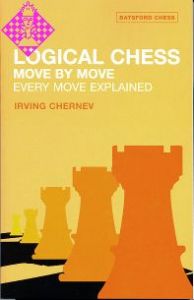 Logical Chess - Move by Move18,95 €
Logical Chess - Move by Move18,95 € -
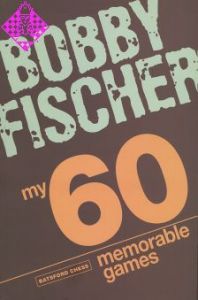 My 60 Memorable Games19,95 €
My 60 Memorable Games19,95 € -
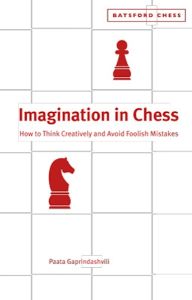 Imagination in Chess20,95 €
Imagination in Chess20,95 € - Mehr von Batsford Chess

